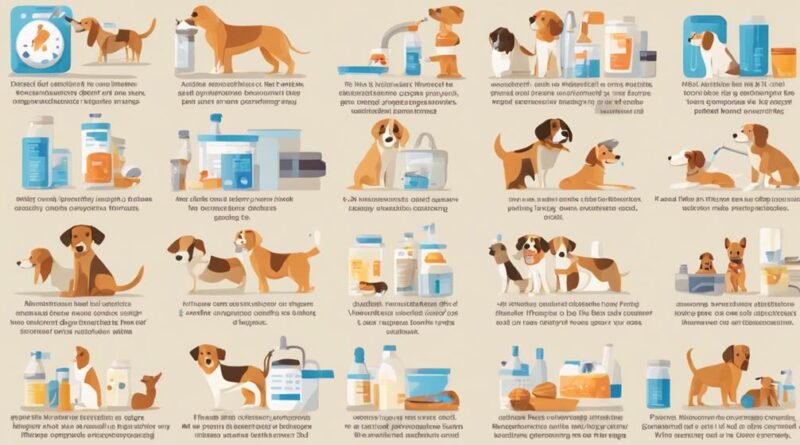Eight Essential Measures to Prevent Dog Diseases
To prevent dog diseases, make sure to follow these essential measures: Keep up with vaccinations for immune protection. Feed a well-balanced diet based on their specifics. Maintain cleanliness through grooming and living space upkeep. Give regular exercise to keep them fit and engaged. Visit the vet for routine check-ups to catch any issues early. Prevent parasites like fleas, ticks, and heartworm. Manage their stress triggers and watch for signs of distress. Focus on dental care with brushing and professional cleanings. By incorporating these eight measures, you'll greatly boost your dog's health and happiness.
Regular Vaccinations
To safeguard your dog's health, ensure they receive their vaccinations on schedule. Following a proper vaccine schedule is crucial in protecting your furry friend from a variety of diseases. Vaccines work by stimulating your dog's immune system to produce antibodies that fight off specific viruses and bacteria. This not only protects your dog but also helps prevent the spread of these diseases to other animals.
Regular vaccinations are essential to maintain your dog's immunity against common and potentially life-threatening illnesses. These immunity boosters are designed to provide long-lasting protection, but to ensure their effectiveness, it's important to adhere to the recommended vaccine schedule provided by your veterinarian.
Puppies typically need a series of vaccinations starting at around six to eight weeks of age, with boosters given every few weeks until they're around four months old. Adult dogs require regular booster shots to maintain their immunity throughout their lives.
Balanced Nutrition
Maintaining a balanced diet is essential for your dog's overall health and well-being. Just like humans, dogs require a proper mix of nutrients to thrive. Proper meal planning is crucial to ensure your furry friend gets the necessary vitamins, minerals, proteins, fats, and carbohydrates. A balanced diet helps support your dog's immune system, maintain a healthy weight, and promote optimal organ function.
When planning your dog's meals, consider their age, size, breed, and activity level. Consulting with a veterinarian can help you determine the right type and amount of food to feed your dog. In some cases, nutritional supplements may be recommended to address specific health concerns or deficiencies. These supplements can provide additional support to keep your dog healthy and happy.
Nutritional supplements shouldn't replace a balanced diet but rather complement it. Always choose high-quality supplements and follow the recommended dosage. Remember that excess supplementation can also be harmful to your dog's health. Additionally, ensure your dog has access to fresh, clean water at all times to support digestion and overall well-being.
Hygiene Practices
When ensuring your dog's well-being, proper hygiene practices play a significant role in preventing potential diseases and maintaining their health. Proper grooming is essential for your dog's overall health. Regular brushing helps to remove dirt, debris, and loose fur, preventing matting and skin irritations. It also stimulates blood flow to the skin, promoting a healthy coat. Additionally, trimming your dog's nails regularly prevents overgrowth, which can lead to pain and difficulties in walking.
Maintaining a clean environment is equally crucial. Make sure your dog's living space is regularly cleaned and disinfected to prevent the buildup of harmful bacteria and parasites. Wash your dog's bedding frequently, as it can harbor fleas, ticks, and allergens that may affect your dog's health. Providing fresh water daily and cleaning food bowls after each meal can prevent bacterial contamination and gastrointestinal issues.
Regular baths are essential to keep your dog clean and free of skin infections. Use a mild dog shampoo and ensure thorough rinsing to avoid skin irritation. Pay special attention to drying your dog completely, especially in areas prone to moisture accumulation, to prevent fungal growth.
Exercise Routine
Ensuring a consistent exercise routine for your dog is crucial for maintaining their overall health and well-being. Regular physical activity not only helps your furry companion stay in shape but also contributes to their mental stimulation and emotional well-being. Engaging in fun activities with your dog isn't only enjoyable for them but also essential for promoting optimal health.
Fun activities such as playing fetch, going for walks, or engaging in interactive toys can help your dog burn off excess energy, prevent obesity, and strengthen their muscles and joints. These activities aren't only physically beneficial but also provide mental stimulation, preventing boredom and potential behavioral issues.
Incorporating a variety of exercises into your dog's routine can ensure that they receive a well-rounded fitness regimen. Consider activities that cater to their specific needs and energy levels. For example, high-energy breeds may benefit from more intense activities like agility training, while smaller or less active dogs may prefer shorter walks or gentle play sessions.
Consistency is key when it comes to your dog's exercise routine. Aim for daily physical activity to keep your furry friend healthy and happy. Remember that a well-exercised dog isn't only physically fit but also mentally alert and emotionally content. By prioritizing regular exercise and engaging in fun activities, you're setting the foundation for your dog to lead a long and healthy life.
Regular Vet Check-ups
Regular veterinary check-ups are essential for monitoring your dog's health and well-being. Your vet can provide valuable recommendations on how to best care for your furry companion and detect any potential health issues early on. These check-ups are crucial in ensuring your dog's overall wellness and longevity.
During regular vet check-ups, your veterinarian will conduct thorough physical examinations to assess your dog's overall health. They'll also discuss any concerns you may have regarding your dog's behavior, diet, or any symptoms they may be exhibiting. Following your vet's recommendations, such as keeping up with vaccinations, implementing a proper diet, and maintaining an exercise routine, is vital in preventing diseases and ensuring your dog's well-being.
In addition to physical exams and addressing your concerns, regular vet check-ups also involve important health screenings. These screenings may include blood tests, fecal exams, and other diagnostic procedures to check for underlying health conditions. Detecting any issues early through these screenings can lead to more effective treatments and better outcomes for your dog.
Parasite Prevention
Parasite prevention is a critical aspect of maintaining your dog's health and well-being. Regular flea control and tick prevention are essential to safeguard your furry friend against the discomfort and potential diseases these parasites can transmit. Fleas can cause skin irritation, allergies, and even anemia in severe cases. Ticks, on the other hand, can transmit serious illnesses such as Lyme disease and Rocky Mountain spotted fever. By using preventive measures recommended by your veterinarian, you can protect your dog from these harmful parasites.
Heartworm protection is another crucial component of parasite prevention. Mosquito bites can transmit heartworm larvae to your dog, leading to potentially fatal heartworm disease. Administering monthly heartworm preventives can effectively safeguard your dog from this deadly parasite.
In addition to external parasites like fleas, ticks, and heartworms, intestinal parasites also pose a threat to your dog's health. Regular deworming treatments as part of intestinal parasite management can help eliminate and prevent issues caused by worms such as roundworms, hookworms, and tapeworms.
Stress Management

To effectively manage stress in your dog, understanding the common triggers and implementing appropriate coping strategies is essential for promoting their overall well-being. Mental well-being in dogs is just as important as physical health. Dogs can experience stress due to various factors such as changes in routine, loud noises, separation anxiety, or even illness. It's crucial to recognize signs of stress in your dog, which may include excessive barking, destructive behavior, or withdrawal.
Implementing relaxation techniques can greatly help in managing your dog's stress levels. Regular exercise is a fantastic way to reduce stress and keep your dog mentally stimulated. Engaging in interactive play, going for walks, or even trying out agility exercises can provide mental and physical stimulation. Additionally, creating a safe and quiet space where your dog can retreat to when feeling overwhelmed is important.
Another effective relaxation technique is massage therapy. Just like humans, dogs can benefit from gentle massages that help reduce tension and promote relaxation. Providing your dog with a comfortable and secure environment is also crucial for their mental well-being. Ensuring they've a cozy bed, access to fresh water, and a balanced diet can contribute to their overall happiness and stress management. By incorporating these techniques into your dog's routine, you can help them lead a healthier and happier life.
Dental Care
Maintaining proper dental hygiene for your dog is crucial for their overall health and well-being. Just like humans, dogs can suffer from dental issues that can lead to more severe health problems if not addressed. Here are some essential tips to ensure your dog's dental care is in top shape:
- Regular Brushing: Use a dog-specific toothbrush and toothpaste to brush your dog's teeth regularly. Aim for at least 2-3 times a week to prevent plaque buildup and maintain oral health.
- Proper Brushing Techniques: When brushing your dog's teeth, use gentle circular motions and focus on the gum line where bacteria tend to accumulate. Be patient and make the experience positive for your dog.
- Dental Treats: Incorporate dental treats into your dog's diet. These treats are designed to help reduce tartar and plaque buildup while freshening your dog's breath.
- Professional Dental Cleanings: Schedule regular dental check-ups with your veterinarian. Professional cleanings are essential to remove stubborn tartar and detect any potential dental issues early.
Frequently Asked Questions
Can Specific Breeds Be More Prone to Certain Diseases?
Certain breeds can indeed be more prone to specific diseases due to breed susceptibility and genetic factors. Understanding these predispositions can aid in disease prevention by allowing for breed-specific considerations in care and preventive measures.
How Can I Prevent My Dog From Overheating During Exercise?
To prevent your dog from overheating during exercise, remember to meet their hydration needs by providing water breaks. Incorporate cooling techniques like wet towels or a kiddie pool.
Limit exercise duration, especially in hot weather, and take shade breaks frequently. Monitoring your dog's behavior and signs of overheating is crucial.
Are There Natural Remedies for Parasite Prevention?
When it comes to parasite prevention for your dog, natural remedies can be effective. Herbal treatments are gaining popularity for repelling fleas and ticks. Ingredients like neem oil, rosemary, and lavender have natural insect-repelling properties. These remedies can offer a chemical-free alternative to traditional preventatives.
Remember to consult with your veterinarian before trying any new treatments to ensure they're safe and appropriate for your dog.
What Signs Indicate My Dog May Be Stressed?
If your dog is stressed, watch out for behavioral changes like excessive barking or pacing. Physical symptoms such as digestive issues or excessive shedding may also indicate stress.
Environmental factors like loud noises or changes in routine can trigger stress. Separation anxiety is common and can lead to destructive behavior.
It's crucial to address stress promptly to ensure your dog's well-being. Consulting a veterinarian can help determine the best course of action for your furry friend.
Is It Necessary to Brush My Dog's Teeth Every Day?
Yes, brushing your dog's teeth every day isn't necessary. Dental chews or other alternatives can help maintain oral health. The frequency of brushing depends on the effectiveness of these methods.
Consult with your veterinarian to determine the best oral care routine for your furry friend.
Conclusion
In conclusion, by following these eight essential measures, you can significantly reduce the risk of your dog developing diseases.
Regular vaccinations, balanced nutrition, hygiene practices, exercise routine, regular vet check-ups, parasite prevention, stress management, and dental care are all crucial aspects of maintaining your dog's health.
Taking proactive steps to ensure your dog's health and well-being won't only benefit them but also strengthen the bond between you and your furry companion.
Prioritize your dog's health to enjoy many happy and healthy years together.
